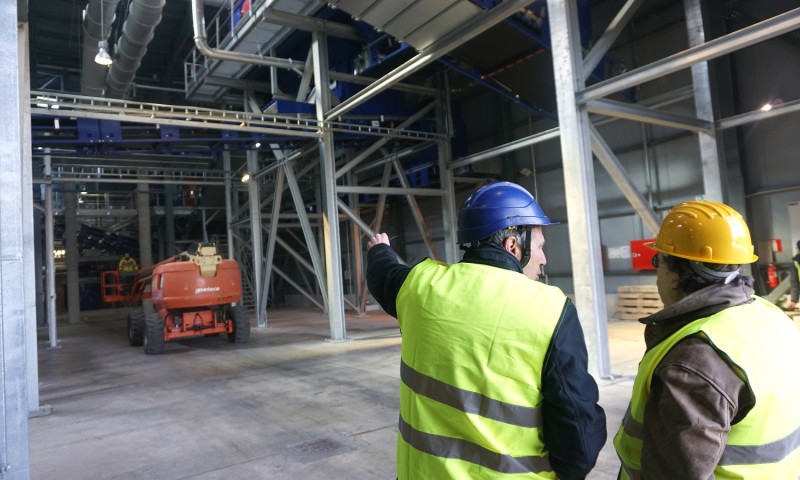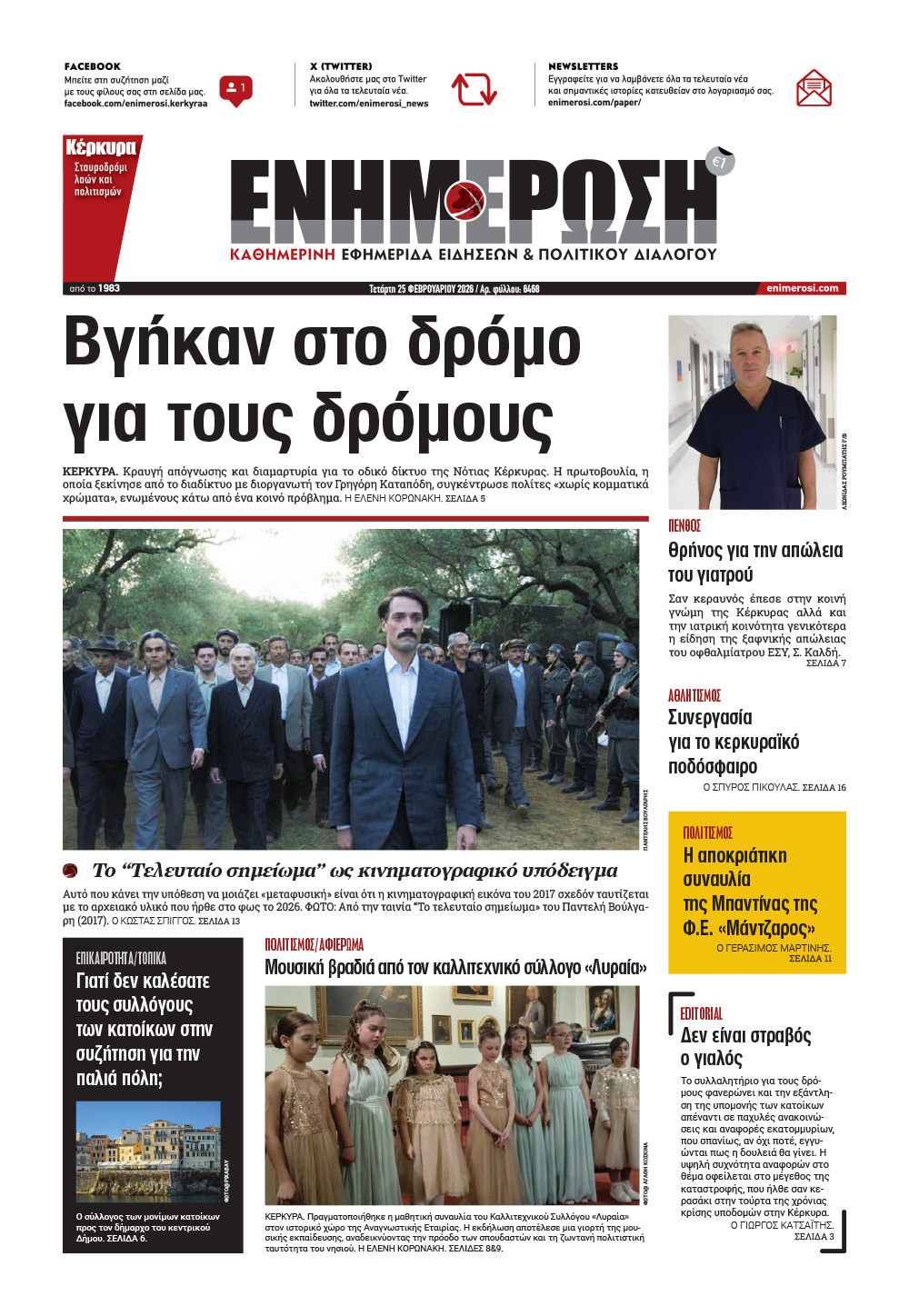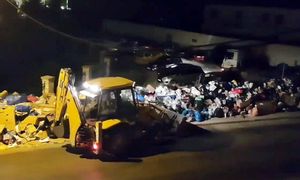The conundrum of Corfu and Ioannina collaborating on waste management. Report from Ioannina waste management facility and landfill

Ioannina
08 Feb 2019
/ 07:51
IOANNINA. How the ΄jewel΄ of a waste management facility could become unsustainable if it doesn΄t operate to its maximum limit.
Combining time, quantity, money and stamina the facility has to produce the sought-after environmental result from waste management. Developments are well under way in Epirus but are still at a standstill in Corfu - although the island hopes to become part of the solution instead of part of the problem, using the example of her neighbour. We decided to visit Ioannina to try and unravel the conundrum - in the district of Elliniko with the regional landfill and residual landfill and in Eleftherohori with its new technological 'jewel' - the Solid Waste Management Unit.

"The landfills in Karvounari and Elliniko also opened with MAT (riot police) present," the President of the Ioannina Waste Management facility Spyros Konstantopoulos (photo) told us. Mr. Konstantopoulos is well aware of the situation in Corfu and has had various visitors from the island in recent days coming to observe the facility.
Solve your problems yourselves
We asked him directly under what conditions his facility would accept the emergency temporary transportation of waste from Corfu until the Ionian tourist resort had its own facility. "If it is requested of me, I will argue against it with board," he tells us. "Unless we are compelled to do it by a ministerial decision (Ministries of the Interior and the Environment)," he added - putting the ball in the court of the national government! He reminds us of Kostas Nikolouzos' frantic, repeated requests to him and the Ioannina facility, the Corfu Mayor's disappointment and the inflexible stance of the Deputy Minister for the Environment Mr. Famelos, who repeated his position in front of Epirus officials last Monday - "Corfu has to solve its problems itself" was his response to the question put to him and he then immediately changed the subject!
Other Regions
However, the revenue forecast for the facility at Eleftherohori, Dodoni expressly mentions that revenue is expected from the management of solid waste from other regions. This keeps the hope alive that both Corfu and Lefkada could find at least a temporary solution and avoid last summer's nightmare with the rubbish on the roads - with the condition that a permanent solution for the two islands is developed at the same time. This hope is reinforced by the need for the new facility to maintain the maximum quantity limit, which keeps the gate fee at the lowest level - leading to the possible consequence of higher municipal cleansing taxes for local authorities, starting with those in Epirus.
This is perhaps the price to be paid in order that the owner/investor be remunerated for his investment. In short, under certain circumstances the Ioannina facility may need the rubbish from Corfu (and other locations) and this is, in any case, included in the original contract of the new facility!
The end recipients
Perhaps the biggest thorn is to be found further down the production chain - with the end recipient. At Elliniko landfill/residual landfill just outside Ioannina and over 35km from the waste management facility Aris Kolovos showed us an exemplary landfill and facilities for the recovery of biogas and the collection and biological treatment of residue.

Visiting the biological treatment plant at Elliniko landfill with the hospitable facility manager Aris Kolovos.
We learn that the facility has been in existence for just under two years and the construction of a new cell is being planned. It receives residue that cannot be processed any further which, according to plant manager Mr. Frantzis, comes to about 37% of the total. If the total reaches the annual limit of 105,000 tons of solid waste, this means approximately 40,000 tons of residue. To this needs to be added the same weight of processed biological waste which, if it hasn't been sorted at source (brown bins), is not permitted to be used as fertiliser/compost for food crops. This is used exclusively as earth covering for landfills and aggregates for quarries etc.
The aggregate of these quantities adversely affects the financial sustainability of what is otherwise an automated facility. Consequently, greater quantities will continuously be sought as well as greater numbers of end recipients in the facility's planned 25-27 years of life.
Trial period
Work started in Epirus in 2013. Earthmoving began in Eleftherohori in September 2017 and the unit is now operating for a trial period until early March, when all the trials and preparations will have been completed and business will then commence. The initial forecast is for approximately 80,000 tons to be handlled/processed annually - much lower than the maximum limit of 105,000 tons of mixed waste.
If we can draw a simple conclusion from all this information, the construction of a facility in Corfu similar to the one in Ioannina could - if it is established on land with planning permission - take from two to six or more years. Given that matters have been at breaking point for quite a time now, temporary relief for the Corfu problem from Ioannina may prove to be mutually beneficial.
Mr. Famelos, however, remained resolutely against the solution when speaking on the phone to Corfu Mayor Kostas Nikolouzos on Wednesday.

"The landfills in Karvounari and Elliniko also opened with MAT (riot police) present," the President of the Ioannina Waste Management facility Spyros Konstantopoulos (photo) told us. Mr. Konstantopoulos is well aware of the situation in Corfu and has had various visitors from the island in recent days coming to observe the facility.
Solve your problems yourselves
We asked him directly under what conditions his facility would accept the emergency temporary transportation of waste from Corfu until the Ionian tourist resort had its own facility. "If it is requested of me, I will argue against it with board," he tells us. "Unless we are compelled to do it by a ministerial decision (Ministries of the Interior and the Environment)," he added - putting the ball in the court of the national government! He reminds us of Kostas Nikolouzos' frantic, repeated requests to him and the Ioannina facility, the Corfu Mayor's disappointment and the inflexible stance of the Deputy Minister for the Environment Mr. Famelos, who repeated his position in front of Epirus officials last Monday - "Corfu has to solve its problems itself" was his response to the question put to him and he then immediately changed the subject!
Other Regions
However, the revenue forecast for the facility at Eleftherohori, Dodoni expressly mentions that revenue is expected from the management of solid waste from other regions. This keeps the hope alive that both Corfu and Lefkada could find at least a temporary solution and avoid last summer's nightmare with the rubbish on the roads - with the condition that a permanent solution for the two islands is developed at the same time. This hope is reinforced by the need for the new facility to maintain the maximum quantity limit, which keeps the gate fee at the lowest level - leading to the possible consequence of higher municipal cleansing taxes for local authorities, starting with those in Epirus.
This is perhaps the price to be paid in order that the owner/investor be remunerated for his investment. In short, under certain circumstances the Ioannina facility may need the rubbish from Corfu (and other locations) and this is, in any case, included in the original contract of the new facility!
The end recipients
Perhaps the biggest thorn is to be found further down the production chain - with the end recipient. At Elliniko landfill/residual landfill just outside Ioannina and over 35km from the waste management facility Aris Kolovos showed us an exemplary landfill and facilities for the recovery of biogas and the collection and biological treatment of residue.

Visiting the biological treatment plant at Elliniko landfill with the hospitable facility manager Aris Kolovos.
We learn that the facility has been in existence for just under two years and the construction of a new cell is being planned. It receives residue that cannot be processed any further which, according to plant manager Mr. Frantzis, comes to about 37% of the total. If the total reaches the annual limit of 105,000 tons of solid waste, this means approximately 40,000 tons of residue. To this needs to be added the same weight of processed biological waste which, if it hasn't been sorted at source (brown bins), is not permitted to be used as fertiliser/compost for food crops. This is used exclusively as earth covering for landfills and aggregates for quarries etc.
The aggregate of these quantities adversely affects the financial sustainability of what is otherwise an automated facility. Consequently, greater quantities will continuously be sought as well as greater numbers of end recipients in the facility's planned 25-27 years of life.
Trial period
Work started in Epirus in 2013. Earthmoving began in Eleftherohori in September 2017 and the unit is now operating for a trial period until early March, when all the trials and preparations will have been completed and business will then commence. The initial forecast is for approximately 80,000 tons to be handlled/processed annually - much lower than the maximum limit of 105,000 tons of mixed waste.
If we can draw a simple conclusion from all this information, the construction of a facility in Corfu similar to the one in Ioannina could - if it is established on land with planning permission - take from two to six or more years. Given that matters have been at breaking point for quite a time now, temporary relief for the Corfu problem from Ioannina may prove to be mutually beneficial.
Mr. Famelos, however, remained resolutely against the solution when speaking on the phone to Corfu Mayor Kostas Nikolouzos on Wednesday.











